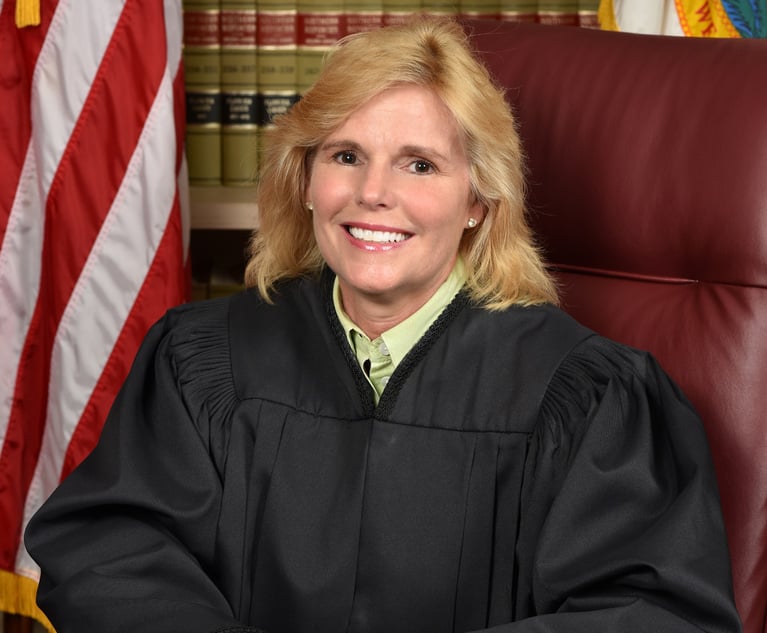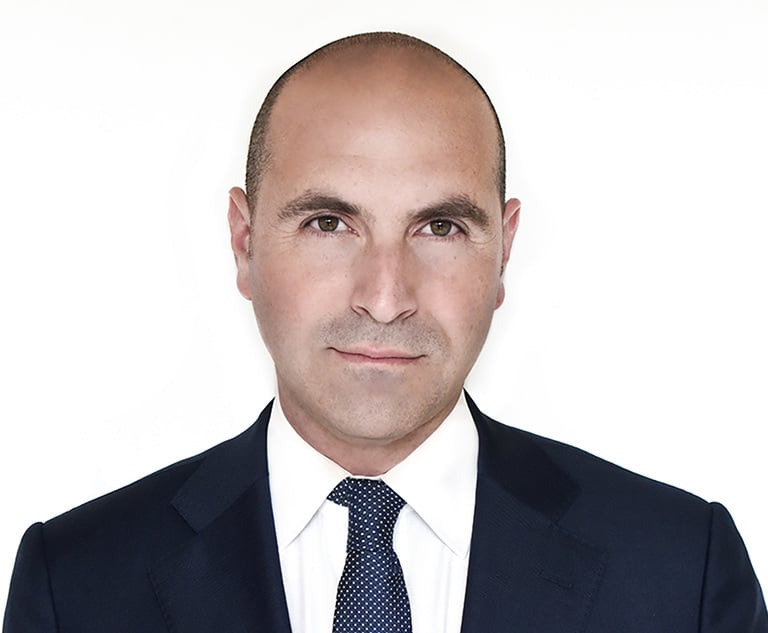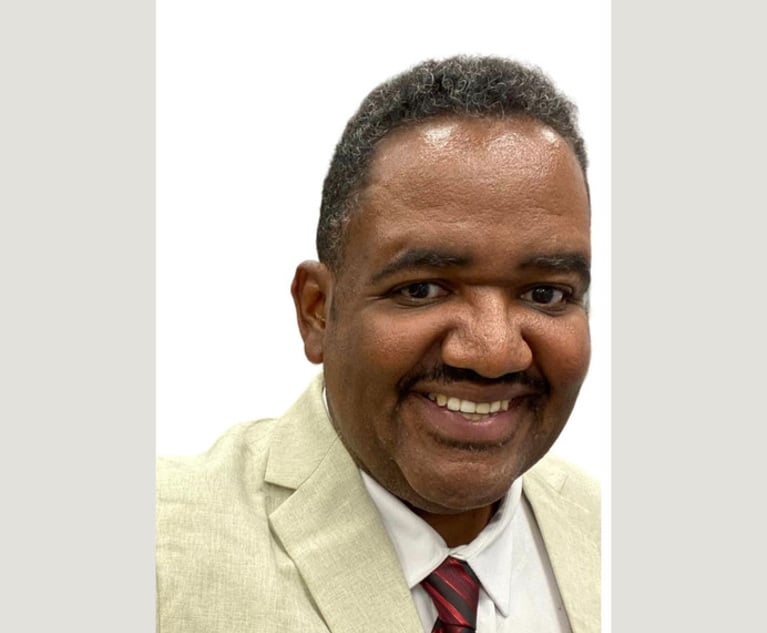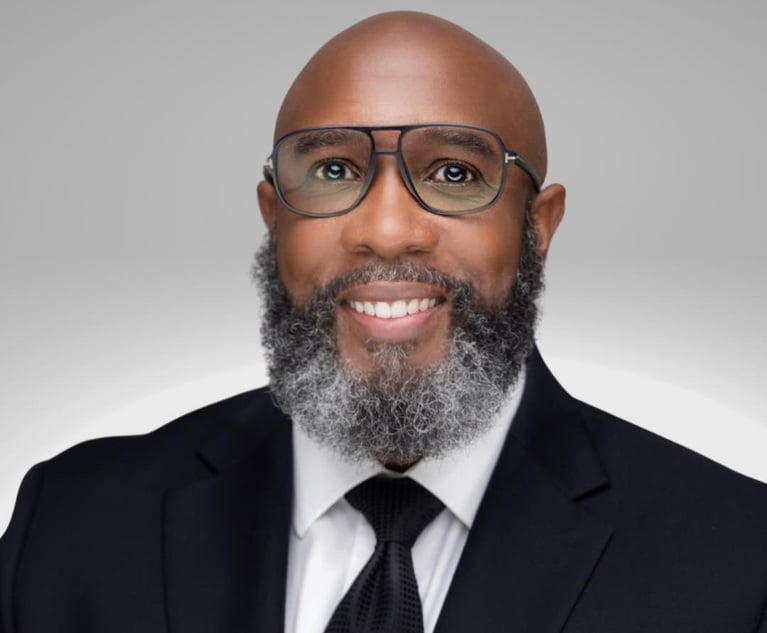Real Estate and Land Use Attorney Spencer Crowley Still Believes In An Environmentally Resilient Miami
Having immersed his life, education and career in Florida's environment and waterways, Spencer Crowley is more than qualified to serve as the head of Akerman's real estate and land use practice group in Miami. But with all of his experience, does he believe the city successfully ward off the environmental challenges waiting around the corner?
September 14, 2018 at 12:05 PM
7 minute read
 Spencer Crowley is a partner at Akerman and head of its real estate and land use practice group in Miami. Courtesy photo
Spencer Crowley is a partner at Akerman and head of its real estate and land use practice group in Miami. Courtesy photo
Few people can claim to have lived in as many of Florida's major cities as Spencer Crowley has: Jacksonville-born and Palm Beach County-raised, the land use and environmental lawyer spent much of his youth immersed in Florida's natural splendor and consequently developed an affinity for fishing and hunting alongside Lake Okeechobee at a very young age. Crowley eventually moved further south to attend the University of Miami Rosenstiel School of Marine and Atmospheric Sciences before moving once more to Gainesville to earn his M.B.A and J.D. from the University of Florida.
After a stint spent working with the Hopping Green & Sams environmental law firm in Tallahassee, Crowley moved to Miami in 2002, a city where he has remained — as well as left a sizable impact — ever since.
Although Crowley has observed and absorbed more of Florida's natural offerings than most do in a lifetime, his passion for the environment and all of the work to be done surrounding it wasn't developed until he left the state for more tropical pastures.
“I went to the Bahamas for the first time in seventh grade with one of my buddies,” Crowley said. “I had the good fortune of being able to go over to the Bahamas every summer from the time I was in seventh grade until I was a senior in high school.”
As Crowley tells it, he would spend his whole summers “fishing, diving and really enjoying everything that the natural environment of the Bahamas could offer.”
With a crash course in natural beauty like that, it's no wonder that the entirety of his professional career has been dedicated to reconciling the inevitable progress of man with the health and sustainability of Florida wildlife.
Prior to finding his calling in legal work, Crowley initially directed his environmentally-oriented education toward a career in the public sector. After earning his undergraduate degree in environmental science and policy at Duke University — where he spent two summers conducting research in the Florida Everglades — Crowley alternated his time as a student at UM with his master's works as an intern for the Governor's Commission for Sustainable South Florida, an advisory group dedicated to the restoration of the Everglades.
Subsequent to that Crowley clerked for the South Florida Water Management District, the regional flood control district, during his first summer of law school.
“Working with them was interesting because I got to see all of the different components of what they do, which is water supply, regulatory permitting for storm water systems, and different aspects of Everglades restoration that they do,” Crowley said.
For as important as he found the work, Crowley soon discovered the job wasn't a good fit for his own personality or ambitions.
“The government work wasn't really for me,” he said. “I just didn't feel like there was enough of an ability to make a difference, especially as a government lawyer.”
But after spending his second law school summer working in private practice, Crowley had finally found the means by which he could best fulfill his goals.
 Photo by CandaceWest.com. From left, Neisen Kasdin, Spencer Crowley, Brenda Goerks, Susanne Zabloudil, Javier Fernandez, and Rich Bezold.
Photo by CandaceWest.com. From left, Neisen Kasdin, Spencer Crowley, Brenda Goerks, Susanne Zabloudil, Javier Fernandez, and Rich Bezold.Upon his return to Miami's sunny shores in 2002, Crowley began working alongside former Miami Beach Mayor Neisen O. Kasdin at the Miami office of prestigious corporate law firm Gunster. Since first working together more than a decade ago, Crowley and Kasdin have stuck with one another in the ensuing 16 years.
“It's really the two of us [who] started what is now the Akerman land use practice here in Miami,” Crowley said. He and Kasdin left Gunster in March 2007 after being recruited to come over to Akerman and have remained there ever since.
“At the time we left Gunster our group was three lawyers,” Crowley said, detailing the legal team he and Kasdin have assembled. “Now we're up to 10 lawyers and a couple of planners. We're focused on large scale land use and environmental permitting, mostly in the urban core.”
Crowley has spent the last decade-and-a-half immersing himself in a litany of Miami real estate and environmental projects. Somehow, he seems to have bridged the seemingly contradictory prospect of working on urban development as well as environmental conversation without compromising either the environment or his own deeply held beliefs about how to best sustain it.
One of Crowley's first big projects with Kasdin was working on Midtown Miami in 2003.
“We're very proud of that because it was the start of a lot of the urban renaissance that happened in downtown,” Crowley said. More recently, Crowley's work has brought him into the commercial spheres of the Brickell City Centre as well as the Miami Design District in addition to work on a variety of marina projects.
 Christian Louboutin store in the Miami Design District. Photo: J. Albert Diaz
Christian Louboutin store in the Miami Design District. Photo: J. Albert DiazHowever — whether on a volunteer basis or in his capacity as a lawyer — Crowley has never failed to make time for projects that conserve the environment that's shaped and directed his career path. “I did some work for the Babcock Ranch, which is over in Charlotte County,” Crowley shared. He was part of the team that successfully negotiated for the conservation of 76,000 acres that are now part of the Babcock Ranch Wildlife Management Area, in turn managing to successfully balance business interests with environmental concerns.
Additionally, Crowley is a three-time gubernatorial appointee to the Florida Inland Navigation District in a volunteer capacity.
“We're the local sponsor for the Intracoastal Waterway, so we help dredge the waterway from Miami all the way up to Jacksonville and partner with the Army Corp of Engineers on that,” Crowley explained. “In addition to that core function, we provide grants to local governments for a lot of different waterfront improvement projects. Anything from bay walks and boat ramps to piers and docks, we help to fund all those kinds of things.”
But even as he's effecting change to the best of his ability, Crowley still has his concerns about Miami and South Florida's future in the face of climate change.
“Over the next century and perhaps two centuries, I think there are a lot of things that this community can do — that this region can do — to make itself more resilient and not only survive, but thrive during that period,” Crowley said. “I think it can be done. But it's going to really stress the public infrastructure; it's going to stress the property tax rate that's assessed on private property. That money is going to be spent in a lot of places — like coastal resilience — that other communities don't have to worry about.”
Crowley understands that it won't be enough to merely survive the trials waiting around the corner; the real challenge will be in ensuring a quality of life that will allow others to enjoy and appreciate the natural world just as he did.
“It's going to be important to see how we pay for those types of improvements but also maintain the quality of life in other aspects, like schools and parks as well as infrastructure like mass transit,” Crowley said. “In the short term I think there's a lot that can be done. Long term … it could be really tricky.”
Spencer Crowley
Born: 1974, Jacksonville Spouse: Nickelle Children: Thomas, Jackson, Ella, Ava Education: University of Florida, J.D. and M.B.A., 2001; University of Miami, M.A., 1998; Duke University, A.B.,1996 Experience: Akerman, 2007-present; Florida Inland Navigation District, 2007-present; Gunster, 2002-2007; Hopping Green & Sams, 2000-2002; South Florida Water Management District Office of General Counsel, 1999; Governor's Commission for Sustainable South Florida, 1997
This content has been archived. It is available through our partners, LexisNexis® and Bloomberg Law.
To view this content, please continue to their sites.
Not a Lexis Subscriber?
Subscribe Now
Not a Bloomberg Law Subscriber?
Subscribe Now
NOT FOR REPRINT
© 2025 ALM Global, LLC, All Rights Reserved. Request academic re-use from www.copyright.com. All other uses, submit a request to [email protected]. For more information visit Asset & Logo Licensing.
You Might Like
View All
Carol-Lisa Phillips to Rise to Broward Chief Judge as Jack Tuter Weighs Next Move
4 minute read
Growing Referral Network, Alternative Fees Have This Ex-Big Law’s Atty’s Bankruptcy Practice Soaring
5 minute read
Against the Odds: Voters Elect Woody Clermont to the Broward Judicial Bench
4 minute readTrending Stories
- 1Buyer Beware:Continuity of Coverage in Legal Malpractice Insurance
- 2‘Listen, Listen, Listen’: Some Practice Tips From Judges in the Oakland Federal Courthouse
- 3BCLP Joins Saudi Legal Market with Plans to Open Two Offices
- 4White & Case Crosses $4M in PEP, $3B in Revenue in 'Breakthrough Year'
- 5Thursday Newspaper
Who Got The Work
J. Brugh Lower of Gibbons has entered an appearance for industrial equipment supplier Devco Corporation in a pending trademark infringement lawsuit. The suit, accusing the defendant of selling knock-off Graco products, was filed Dec. 18 in New Jersey District Court by Rivkin Radler on behalf of Graco Inc. and Graco Minnesota. The case, assigned to U.S. District Judge Zahid N. Quraishi, is 3:24-cv-11294, Graco Inc. et al v. Devco Corporation.
Who Got The Work
Rebecca Maller-Stein and Kent A. Yalowitz of Arnold & Porter Kaye Scholer have entered their appearances for Hanaco Venture Capital and its executives, Lior Prosor and David Frankel, in a pending securities lawsuit. The action, filed on Dec. 24 in New York Southern District Court by Zell, Aron & Co. on behalf of Goldeneye Advisors, accuses the defendants of negligently and fraudulently managing the plaintiff's $1 million investment. The case, assigned to U.S. District Judge Vernon S. Broderick, is 1:24-cv-09918, Goldeneye Advisors, LLC v. Hanaco Venture Capital, Ltd. et al.
Who Got The Work
Attorneys from A&O Shearman has stepped in as defense counsel for Toronto-Dominion Bank and other defendants in a pending securities class action. The suit, filed Dec. 11 in New York Southern District Court by Bleichmar Fonti & Auld, accuses the defendants of concealing the bank's 'pervasive' deficiencies in regards to its compliance with the Bank Secrecy Act and the quality of its anti-money laundering controls. The case, assigned to U.S. District Judge Arun Subramanian, is 1:24-cv-09445, Gonzalez v. The Toronto-Dominion Bank et al.
Who Got The Work
Crown Castle International, a Pennsylvania company providing shared communications infrastructure, has turned to Luke D. Wolf of Gordon Rees Scully Mansukhani to fend off a pending breach-of-contract lawsuit. The court action, filed Nov. 25 in Michigan Eastern District Court by Hooper Hathaway PC on behalf of The Town Residences LLC, accuses Crown Castle of failing to transfer approximately $30,000 in utility payments from T-Mobile in breach of a roof-top lease and assignment agreement. The case, assigned to U.S. District Judge Susan K. Declercq, is 2:24-cv-13131, The Town Residences LLC v. T-Mobile US, Inc. et al.
Who Got The Work
Wilfred P. Coronato and Daniel M. Schwartz of McCarter & English have stepped in as defense counsel to Electrolux Home Products Inc. in a pending product liability lawsuit. The court action, filed Nov. 26 in New York Eastern District Court by Poulos Lopiccolo PC and Nagel Rice LLP on behalf of David Stern, alleges that the defendant's refrigerators’ drawers and shelving repeatedly break and fall apart within months after purchase. The case, assigned to U.S. District Judge Joan M. Azrack, is 2:24-cv-08204, Stern v. Electrolux Home Products, Inc.
Featured Firms
Law Offices of Gary Martin Hays & Associates, P.C.
(470) 294-1674
Law Offices of Mark E. Salomone
(857) 444-6468
Smith & Hassler
(713) 739-1250







